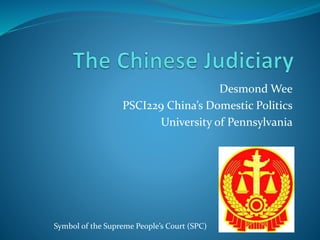The Chinese Judiciary
- 1. Desmond Wee PSCI229 China’s Domestic Politics University of Pennsylvania Symbol of the Supreme People’s Court (SPC)
- 3. Donald Clarke, Peter Murrell, and Susan Whiting, “The Role of Law in China’s Economic Development,” in China’s Great Economic Transformation, (Cambridge University Press, 2008) chapter eleven, pp. 375-428
- 4. Problems of China’s Legal System Today  Significant gaps in legal structure governing economic activity  Lacks a number of institutional features that could be effective in identifying and reducing the inevitable gaps and ambiguities  “Local protectionism”: dependence of courts on local government and Party leaders  Corruption
- 5. Rights Hypothesis  “…[E]conomic growth requires a legal order offering stable and predictable rights of property and contract” However,  Clarke, Murrell & Whiting (CMW): “…provides little explanatory power for China.”
- 6. Functional Substitutes for Formal Institutions ÔÇó Property Rights ÔÇó Cadre evaluation system (Lecture 7; Whiting) ÔÇó Fiscal system (Lecture 7; Whiting) ÔÇó Local government ownership of township and village enterprises (TVEs) ÔÇó Transactions in Goods & Services ÔÇó Dual-track system ÔÇó Footnote: Transitional institutions vs. Best-practice institutions (Qian, 2003)
- 7. Conclusion  The relationship between legal and economic development was bidirectional – a coevolutionary process  Have formal legal institutions contributed in an important way to China’s remarkable economic success? No, but instead…  Economic success has fostered the development of law, rather than the reverse.
- 9. Jerome Cohen’s Testimony to the Congressional-Executive Commission on China
- 10. Criminal Justice  Death penalty  Criminal Procedure Law (CPL)  No warrants  Arrest  Search  (Mostly) no bail/“release under guaranty pending trial”  Limited right to counsel  False confessions gained by torture  UN Convention Against Torture  Section 306 of the Criminal Law  Reeducation through labor (“laojiao”)
- 11. Major Defects  National People’s Congress (NPC) Standing Committee (NPCSC) reserves the sole power to modify legislation; interpret and apply the Constitution  The Chinese Constitution is not enforced  No judicial review for courts: invalidating legislation is prohibited  Conflict: courts must seek a resolution from a higher-level legislative body OR rule in accordance with the lower-level rule
- 12. Constitutional Review: The NPC Review Model  NPCSC  Law on Legislation  Sun Zhigang case  Limited review:  Administrative Litigation Law  State Compensation Law  Supreme People’s Court  2001 education case “Reply to Qi Yuling”; 2008 update  [Update:] 2011 SinaWeibo case  (Independent?) Constitutional Court?
- 13. Further reading  Judicial reform: Court orders http://www.economist.com/news/china/21591210-it-turns-out-torturing- people-confessions-isnt-all-right-after-all-court-orders  China’s Constitutional Crisis http://www.theatlantic.com/china/archive/2013/09/chinas-constitutional- crisis/279285/  Citizens’ Rights, the Constitution and the Courts http://blogs.wsj.com/chinarealtime/2011/09/26/citizens%E2%80 %99-rights-the-constitution-and-the-courts/  Chinese Judge Expresses Support for Free Speech on SinaWeibo in Ruling http://www.businessinsider.com/chinese-judge-expresses-support- for-free-speech-on-sina-weibo-in-ruling-2011-9  A Comment on the Rise and Fall of the Supreme People’s Court’s Reply to Qi Yuling’s Case http://suffolklawreview.org/wp-content/ uploads/2013/01/Tong_AdvancePrint.pdf





![Rights Hypothesis
 “…[E]conomic growth requires a legal order offering
stable and predictable rights of property and contract”
However,
 Clarke, Murrell & Whiting (CMW): “…provides little
explanatory power for China.”](https://image.slidesharecdn.com/thechinesejudiciary-141126142717-conversion-gate02/85/The-Chinese-Judiciary-5-320.jpg)






![Constitutional Review:
The NPC Review Model
ÔÇó NPCSC
ÔÇó Law on Legislation
ÔÇó Sun Zhigang case
ÔÇó Limited review:
ÔÇó Administrative Litigation Law
ÔÇó State Compensation Law
 Supreme People’s Court
 2001 education case “Reply to Qi Yuling”; 2008 update
ÔÇó [Update:] 2011 SinaWeibo case
ÔÇó (Independent?) Constitutional Court?](https://image.slidesharecdn.com/thechinesejudiciary-141126142717-conversion-gate02/85/The-Chinese-Judiciary-12-320.jpg)
